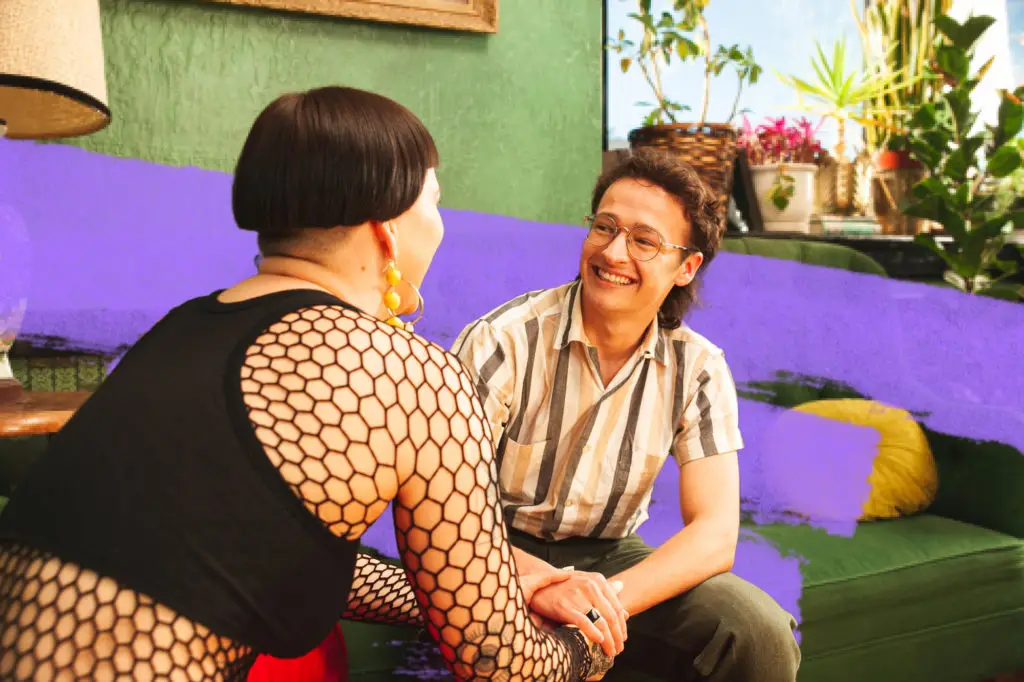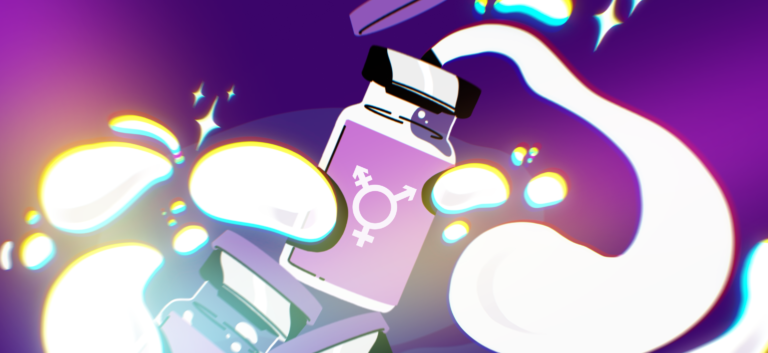Dating as a trans person can bring up a lot of questions, especially when it comes to disclosure. Should you tell someone before the first date? After? What if you’re not ready, or if you’re still figuring things out yourself? There’s no one-size-fits-all answer, but what is true is that your comfort, safety, and truth all matter.
This blog isn’t here to tell you what to do. It’s here to offer perspective, explore some of the risks and realities, and help you make the right call for you. Let’s get into it.
Join thousands of trans and non-binary folks getting expert gender-affirming care with Plume.
Table of Contents
Why Disclosure Can Feel So Heavy
Let’s start by naming what’s real: there are things at stake when disclosing your trans status. There are possibilities like rejection, awkward questions, or even unsafe situations. That weight isn’t imaginary. For many trans people, disclosure isn’t just a matter of preference or timing. It’s about safety. It’s about being seen. It’s about the kind of relationship you want to build.
Some trans people worry they’ll be accused of “lying” if they don’t disclose right away. But here’s the thing: you are not obligated to share everything about yourself with everyone you meet. Your identity is valid whether you choose to tell someone on the first date, the fifth date, or never. That doesn’t make you dishonest. That makes you a human who’s navigating a complicated world.
Still, that doesn’t mean it’s easy. Disclosure is deeply personal, and it often comes with real emotional labor.
Figuring Out What Feels Right for You
Before you even get into the logistics of when or how to disclose, it’s worth checking in with yourself. What are your hopes around dating? Are you looking for something casual? Long-term? Are you out in most areas of your life, or just starting to explore that? It might help to ask yourself:
- What would make me feel safe in this situation?
- What kind of response am I hoping for?
- What would I do if this person reacts badly?
There’s no perfect or “correct” answer. But having your own internal compass before you start a conversation with someone else can go a long way.
When Is the “Right” Time to Tell Someone?
Let’s be honest: timing disclosure can feel like mental gymnastics. If you tell someone too soon, it might feel like you’re oversharing. If you wait, they might feel like you are hiding something. Neither of those things is true across the board, but they’re common worries. Here are a few common approaches people take:
Before the first date
Some folks put it directly in their dating app profile or bring it up in early messages. This can weed out people who aren’t worth your time and cut down on awkward or unsafe interactions. The downside is that it can open the door to fetishization or invasive questions from people you’ve barely spoken to.
After you’ve had a chance to connect
Others prefer to wait until there’s some trust built. Maybe that’s after a few conversations or a first meet-up. This can help ensure the person is interested in you, not just your gender history. Of course, the longer you wait, the more vulnerable it can feel.
Never (and that’s okay too)
For some, especially those who are stealth, the idea of disclosing isn’t even on the table. That’s valid. You don’t owe anyone your story, especially if you’re not interested in a long-term connection or if disclosure would put you in danger.
At the end of the day, the “right” time is whenever it aligns with your comfort, your values, and your safety.
How to Start the Conversation
Okay, so let’s say you’ve decided to tell someone. Maybe you feel like you’re ready. Maybe you’re nervous, but know it’s important to you. Either way, you deserve to feel empowered in how you share your truth. Here are some tips that can help:
Be clear, not apologetic
You don’t have to minimize who you are. Try something like, “Before we get closer, there’s something important I want to share. I’m trans. That’s part of who I am, and it matters to me that you know.”
Another option is, “Just so you know, I’m a trans woman/man/non-binary person. If you have questions, I’m happy to talk, but only if you’re coming from a respectful place.”
Set boundaries
You get to decide how much you share. It’s okay to say, “I’m happy to tell you this, but I’m not up for talking about medical stuff or my past. Hope you understand.”
Practice with someone you trust
Saying it out loud ahead of time can make a big difference. Maybe you roleplay with a trusted friend or even say it to yourself in the mirror. It doesn’t have to be perfect. It just has to be true to you.
Watch for red flags
If the person responds with disrespect, invasive curiosity, or anything that makes you feel unsafe, that’s not someone you need in your life. You deserve someone who sees you clearly and treats you with care.
Navigating Reactions: The Good, The Bad, and The Complicated
Some people will surprise you with how thoughtful and affirming they are. Others might disappoint you, even if they mean well. And some will show you right away that they’re not the one. That spectrum of reactions can be hard to brace for. Here are a few truths to hold on to:
Rejection isn’t always about you
Some people just haven’t done the work to understand or unlearn harmful beliefs. That’s on them.
You don’t owe education
It’s not your job to guide someone through Trans 101 unless you want to.
Your worth is not up for debate
Whether someone accepts or rejects you, you are still whole, still worthy, still lovable.
Even when disclosure goes well, it might bring up emotions. Give yourself space to feel whatever comes up. You’re allowed to be relieved, joyful, anxious, disappointed—whatever it is, it’s valid.
What to Do When You’re Just Not Ready
Sometimes the advice out there assumes everyone wants to disclose, or is in a place where that’s possible. But the truth is, not everyone is there yet.
Maybe you’re early in your transition. Maybe you’re in a small town. Maybe you just don’t feel safe. All of that matters.
It’s okay to take your time. It’s okay to focus on friendships first. It’s okay to date other trans folks or people in queer communities who “get it” without needing everything spelled out. You’re allowed to move at your own pace.
At the end of the day, disclosing your trans status in dating is about more than risk. It’s about connection. It’s about finding someone who sees you, respects you, and values you, not despite who you are, but because of it.
The right people won’t make you feel like your identity is a hurdle. They’ll make you feel like your truth is a gift. And you deserve nothing less. Whether you’re swiping through apps, dipping your toe into a new crush, or still figuring out if you want to date at all, just know this: you don’t have to figure it all out today. Your story is unfolding, and you get to decide how and when to share it.



